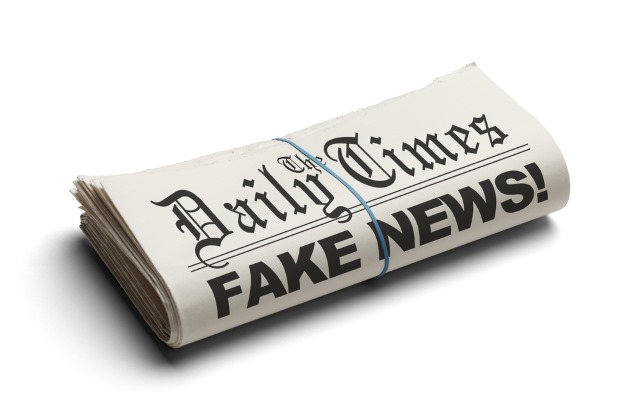Three ways to protect your brand from fake news and other frauds

Fake news is not new. It has been around since the invention of print some 500 years ago. It was used to sensationalize and inflame passions and prejudices, a trend that’s carried over into our current culture. Today, fake news is increasingly being combined with social media to peddle products with false claims and endorsements.
MSNBC columnist, Herb Weisbaum, describes this phenomenon perfectly: "Some sleazy companies are using a deceptive marketing technique to trick people into buying wrinkle creams and diet pills. They've created fake news websites with fake celebrity stories and fake product endorsements."
In one of his pieces, Weisbaum cites an article on a very authentic looking "news" site called Entertainment Today (not to be confused with EntertainmentToday.net’s real news site). The headline reads: "The Shocking Reason Joy Behar Is Quitting the View! Joy Behar Reveals All."
The reason? To spend full-time working on her "wildly popular anti-aging skin care line," JuvaLux. In reality, not only did Behar have no intention of leaving The View, she had absolutely no association with JuvaLux in any way, shape, or form.
Barbara Corcoran of Shark Tank faced a similar situation and recently appeared on The Dr. Oz Show to discuss how her name and image were being used to sell fake face cream and scam consumers. Corcoran was so irate that this was happening, she actually traveled to California to hunt down the man responsible for the deceiving ads -- and track him down she did.
She and her film crew went to his office and confronted him face-to-face. When called out about the deceptive practices he and his brother were engaging in, the owner denied any culpability and instead blamed his "affiliates," whom he could not name.
Affiliates are to blame? This scammer’s accusation is perplexing, especially since the affiliate model is one of the only trackable and attributable forms of marketing that exists. What’s more is that almost every major brand, including Target, Amazon, Apple, and Nordstrom has an affiliate program. The truth that he didn’t want to share on camera is that he was offering very high commissions to affiliates to promote dubious products and was intentionally looking the other way. This way he had plausible deniability.
While Barbara was able to find and confront those responsible for intentionally using her name and image to sell products, brands are often unaware that individuals in their affiliate programs are engaging in objectionable behavior. This can include trademark bidding, hiding or diverting links to cheat legitimate affiliates, driving fake leads, and click fraud.
Fortunately, there are ways that you can protect your brand from exposure to such nefarious activities:
1. Work only with credible partners
While the vast majority of affiliates and influencers are ethical and authentic in their marketing efforts, it’s still important to be selective about whom you partner with. Work only with networks, agencies, and publishing partners who can provide insight and viewability into what they are doing to promote your products and services. It’s also vital to know how their compensation is tied to outcomes.
This also applies to any In-direct affiliate partners who may be promoting your products and services through a sub-affiliate network.
2. Separate the management of your program from your affiliate network
Although there are many benefits to partnering with affiliate networks, having them manage your affiliate program in its entirety is not one of them; this arrangement lacks the proper checks and balances. The fact that affiliate networks represent both publishers and merchants in the same transaction presents potential conflicts of interest.
A conflict-free structure would be to have an experienced and dedicated person within your company overseeing your program’s strategy, budget, performance, and brand alignment. If you don’t have that resource, then working with an experienced third-party agency to manage the day-to-day requirements of the program can be a valuable partnership.
This separation and independence is necessary to remove partners who are not brand-aligned; set and adjust commissions where needed; void sales; monitor for fraud, etc.
3. Ensure partners are adhering to FTC guidelines
The Federal Trade Commission (FTC) could not be more clear. If someone is getting compensated by a brand for promoting their products and services, they must disclose that -- clearly and conspicuously. If they don’t, then the FTC will take strong action against the brand who incentivized them.
Most credible affiliate partners are aware and compliant with the FTC’s guidelines. However, general "influencers" often aren’t and can put brands at risk. For example, the FTC slapped Lord & Taylor with a hefty fine and penalties because they paid fashion "influencers" who didn’t disclose that they were getting compensated.
One of the most important things you can do to prevent this from happening to your brand is to ensure the day-to-day management of your program is in the hands of a highly qualified team of people who understand the FTC’s requirements and the intricacies around partner recruitment, activation, optimization, and oversight.
Unscrupulous individuals have long misrepresented legitimate forms of marketing to take advantage of companies and consumers alike. However, in the eyes of the public and many government agencies, the buck stops with you. Therefore, to ensure that your brand remains held in high regard, it’s critical to take steps to reduce your exposure to corrupt collaborators; that starts with being mindful about whom you partner with.
Image credit: Mega Pixel / Shutterstock
 Robert Glazer is the founder and Managing Director of Acceleration Partners, founder and Chairman of BrandCycle and author of Performance Partnerships: The Checkered Past, Changing Present and Exciting Future of Affiliate Marketing. He is a serial entrepreneur with an exceptional track record and passion for growing revenue and profits for B2C-based companies, partnering with brands such as adidas, ModCloth, Reebok, Target, Tiny Prints, Gymboree, and Warby Parker. For more information, please visit www.accelerationpartners.com and connect with Glazer on Twitter, @robert_glazer.
Robert Glazer is the founder and Managing Director of Acceleration Partners, founder and Chairman of BrandCycle and author of Performance Partnerships: The Checkered Past, Changing Present and Exciting Future of Affiliate Marketing. He is a serial entrepreneur with an exceptional track record and passion for growing revenue and profits for B2C-based companies, partnering with brands such as adidas, ModCloth, Reebok, Target, Tiny Prints, Gymboree, and Warby Parker. For more information, please visit www.accelerationpartners.com and connect with Glazer on Twitter, @robert_glazer.
